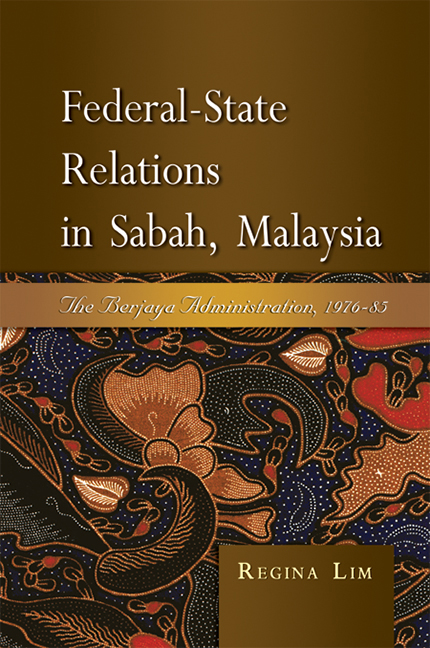Book contents
- Frontmatter
- Contents
- List of Tables and Figures
- Acknowledgements
- Abbreviations and Glossary of Terms
- 1 Introduction
- 2 Sabah Before Malaysia
- 3 Contesting the Rules of the Game, 1963–76
- 4 BERJAYA and Federal-state Relations
- 5 Development and Patronage
- 6 The Contest for Islamic Leadership and Multiracial Votes
- 7 Epilogue and Conclusion
- References
- Index
- About the Author
2 - Sabah Before Malaysia
Published online by Cambridge University Press: 21 October 2015
- Frontmatter
- Contents
- List of Tables and Figures
- Acknowledgements
- Abbreviations and Glossary of Terms
- 1 Introduction
- 2 Sabah Before Malaysia
- 3 Contesting the Rules of the Game, 1963–76
- 4 BERJAYA and Federal-state Relations
- 5 Development and Patronage
- 6 The Contest for Islamic Leadership and Multiracial Votes
- 7 Epilogue and Conclusion
- References
- Index
- About the Author
Summary
INTRODUCTION
James Ongkili, a native Kadazan historian of Sabah and politician who figured prominently in the BERJAYA Administration, once described North Borneo before the founding of the British North Borneo Company in 1881 as a geographical realm with “no community, no overall administration, no State economy, no State government … only mountains, jungles, rivers and the surrounding seas, and isolated villages scattered over the more than 29,000 square miles of tropical and warm equatorial land” (Ongkili 1981, p. xxvii). Indeed, these remarks were made in his introduction to a Commemorative History of Sabah, sponsored by the BERJAYA State Government as part of a ‘centenary’ celebration. For Ongkili and, implicitly, the State Administration in which he was the senior cabinet ‘representative’ of the native, non-Muslim ethnic groups, the history of Sabah began with colonialism — a sentiment markedly at odds with the intellectual and political discourse of nationalists in West Malaysia and beyond, who are usually at pains to emphasize the glory of pre-colonial political systems such as, in the West Malaysian case, the Sultanate of Melaka (Brown 2007; cf. Smith 1999).
Before Western colonialism, the Brunei Sultanate was a major power in the region, controlling substantial portions of Borneo and southern parts of the Philippine archipelago. However, the Brunei Sultanate began to lose its territories between 1840 and 1890 as a result of the expansionist policies of the Brooke regime in Sarawak and the presence of British North Borneo Company (BNBC). The rapid ‘dismemberment’ of Brunei therefore happened through the process of the cession of many rivers, except for the Limbang River which was annexed by the Brooke regime in 1890 — an occupation that the Brunei Sultan has never legally conceded till today (Tarling 1971; Wright 1970).
- Type
- Chapter
- Information
- Federal-State Relations in Sabah, MalaysiaThe Berjaya Administration, 1976–85, pp. 10 - 39Publisher: ISEAS–Yusof Ishak InstitutePrint publication year: 2008

